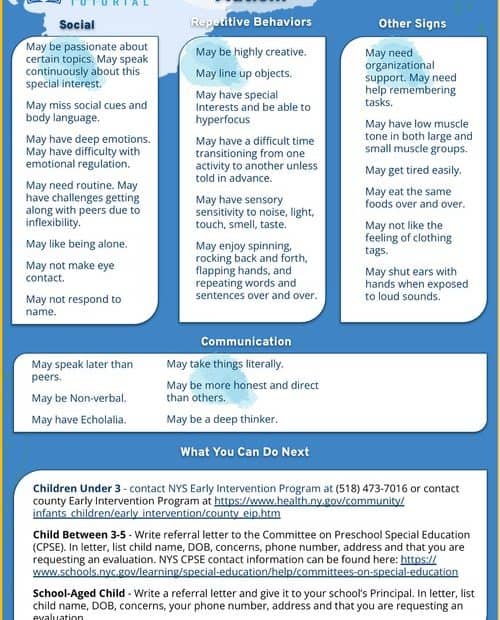Naveed is in 2nd grade and has been having a challenging time in school. While his teacher goes through her lessons, Naveed continuously stims, or engages in repetitive behaviors, inadvertently disrupting the class from learning. He oftentimes verbally stims, singing songs and vocalizing the alphabets repeatedly. He is unable to sit still, and can be found bouncing in his seat, drumming his fingers on his desk and spinning in circles around his classroom. Naveed was also diagnosed with Autism in May 2022 and has a 504 plan with his school to accommodate his special academic and behavioral needs.
Autism is a unique way of experiencing the world that affects communication, social interaction, and behavior. It is a neurodivergent condition, which means that it is a natural variation in the human brain that affects the way a person perceives and interacts with the world around them.
Individuals with autism have their own strengths, interests, and ways of engaging with the world.
Here are a few signs that are often associated with autism:
- Unique social communication style: Individuals with autism may have a different way of communicating and socializing that may not fit traditional social norms. They may have difficulty with small talk, struggle with nonverbal cues, or find it challenging to form social relationships.
- Repetitive behaviors and routines: Individuals with autism may have particular habits, routines, or interests that they enjoy and may engage in for long periods of time. They may also become upset if these routines are disrupted.
- Sensory differences: Individuals with autism may experience the world differently than others. They may be more or less sensitive to different sensory stimuli, such as sounds, lights, textures, or smells.
- Unique interests and strengths: Individuals with autism often have strong interests or skills in specific areas, such as math, music, or art. They may also be very detail-oriented and have an excellent memory for facts and details.
It’s important to note that each individual with autism is unique, and the way they experience the world can vary widely. However, by understanding these signs, we can better support and empower individuals with autism to live their best lives.
If you or someone you know is on the autism spectrum, it’s essential to remember that there is nothing wrong with being neurodivergent. Many individuals with autism have gone on to achieve great things and make important contributions to society. By embracing and celebrating neurodiversity, we can create a world that values and supports all individuals, regardless of their differences.
If you think your child may have autism, it’s important to seek an evaluation to determine their needs and access appropriate resources. The process for evaluation differs depending on the age of your child.
Children Under 3
If your child is under three years old, you can contact the NYS Early Intervention Program at (518) 473-7016 or your county’s Early Intervention Program to request an evaluation.
Children Between 3 and 5 Years Old
For a child between three and five years old, you need to write a referral letter to the Committee on Preschool Special Education (CPSE) listing your child’s name, date of birth, concerns, phone number, address, and that you are requesting an evaluation. You can find contact information for the NYS CPSE here:
https://www.schools.nyc.gov/learning/special-education/help/committees-on-special-education
School Aged Children
For a school-aged child, you should write a referral letter and give it to your school’s principal. In the letter, list your child’s name, date of birth, concerns, phone number, address, and that you are requesting an evaluation.
Remember, early intervention and access to appropriate resources can make a huge difference in the lives of individuals with autism. With the right support, individuals with autism can thrive and achieve great things.
At Khan’s Tutorial, Dr. Ivan Khan and Tasneem Imam Khan created an infographic for our parents and students illustrating the Signs and Symptoms of Autism along with how to obtain an evaluation:

